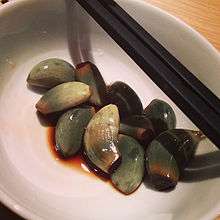Laba garlic

The Laba garlic is a vinegar-preserved garlic. Its refined color is green and its taste is sour and slightly spicy. Because it is usually made in the Lunar December 8 (lunar month December the eighth, the Laba Festival), it was named Laba garlic. In general, green and vinegary garlic is called Laba garlic.[1][2]
Laba vinegar is the vinegar used to pickle the Laba garlic. The custom of making Laba garlic is more prevalent in northern China. Laba garlic and vinegar with dumplings are traditional foods for the Spring Festival in China. Laba garlic alone could also be a Chinese New Year dish.[3]
Culture
The specific history of Laba garlic is unknown; One popular saying is that "garlic" and "count" are homonyms in Chinese. Businessmen usually count their financial income and expenditure of the year in lunar December eighth, and creditors also collect debts on this day. Because this day is close to China's traditional Spring Festival, the firms tapu direct debt collecting in people’s homes. So the gift of vinegar pickled garlic indicated debt collection.
The Laba garlic being made in the eighth day of December also has a correlation with Buddhism. Buddhists allusion in this day Sakyamuni attained Buddhahood, some say Laba garlic is prepared for Buddha.
Preparation
Prepare a container. Skin and wash the garlic. Put garlic and vinegar into the container and seal it. Sugar and salt may be added according to personal preference. Place it in a low-temperature environment. Storage time is not fixed, usually about 20 days, until the color is green.
In some areas and families, there is a method of making "Orthodox" Laba garlic, using specific purple garlic and rice vinegar in the eighth day of lunar December.
References
- ↑ Make Laba garlic in December, Qingdao News
- ↑ Block, E. (2010). Garlic and Other Alliums: The Lore and the Science. Royal Society of Chemistry. ISBN 978-0-85404-190-9.
- ↑ Happiness inside Laba garlic), 163news